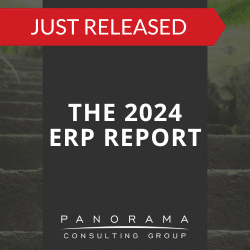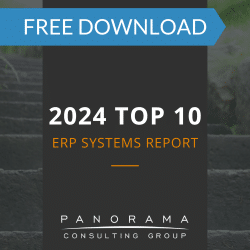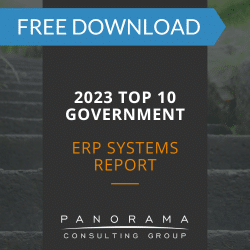Many of our C-level clients are golf addicts. What they often don’t realize, is just how much golf might be teaching them about a successful ERP implementation. Though they may sound unrelated – or a far-reaching attempt to create excuses to spend less time in the office and more time on the golf course – the sport does have a lot in common with ERP software initiatives. They are complex, they could be highly frustrating and they both require a great deal of practice to get successful results.
So, while you’re playing 18 throughout the summer months, keep these similarities in mind:
1. Success Requires a Diverse Set of Skills
One of the most challenging parts of golf is how many different skills are required to be a successful player. You must be able to tee off well, make fairways shots, chip, putt, find ways to get out of the sand, and read the speed of the greens – and it’s very difficult to be good at all of those things at the same time. Similarly, ERP implementations require you to be a strong visionary, a good project manager, someone who understands the nuances of organizational change, and an improver of business processes. These are very diverse, yet very important, skill-sets needed to make your initiative successful.
2. ERP Implementations Can be Frustrating
Just when you think you have it all figured out, bad habits or problems creep in to ruin your game. You finally start chipping well, but your long game falls apart. It’s like playing the old whack-a-mole game from arcades back in the day: new challenges and problems keep popping up. The same is true for ERP implementations. Just when you start to get comfortable with the technical aspects of your digital transformation, your business process hiccups or organizational change issues start to creep up on you. This can be frustrating, especially when you are not able to practice every day.
SAP vs. Oracle Case Study
SAP and Oracle both invest heavily in cloud technology. However, our client was skeptical about cloud scalability and unsure if the products were mature and proven.
3. Practice and Repetition are the Key
It’s impossible to be good at either golf or ERP software initiatives without a lot of practice. Unfortunately, most don’t have the time or focus to practice these things as much as required to master the game. The average CIO is lucky to golf once a week and go through an ERP implementation once every 10 years or so. Neither is enough to put you in a position to join the PGA tour or make the list of top 10 ERP implementations of the year. So, just as you need to relentlessly practice your golf swing to get it right, you also need to practice the methodology of an ERP implementation until you’ve perfected it. If you haven’t done this yet, then be sure to hire proven experts that can fill in that need for you.
4. Both are Games of Inches
Having your club face off by just one degree or missing the hole by just a few inches can be the difference between par versus a double bogey. It applies for ERP implementations as well: if you underinvest in something critical like project governance or organizational change, your project can still fail – despite having done everything else masterfully. Precision is extremely important in both games.
5. Things Can Go Off the Rails Quickly if You’re Not Careful
The average game of 18 holes takes three to four hours, and a lot can go wrong in that time if you lose focus or get sloppy. ERP implementations last an average of 18 months, which is a long time to stay focused, disciplined, and deliberate in your efforts. To be successful, it’s important to not let up or take your eye off best practices and your desired end state.
Don’t feel guilty the next time you break away from the office to sneak in 9 holes, instead, think about these important lessons that you can take directly from the golf course to apply to your ERP project.














